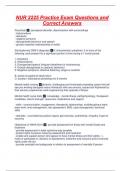NUR 2225 Practice Exam Questions and
Correct Answers
Psychosis ✅- perceptual disorder, disconnection with surroundings
- hallucinations
- delusions
- negative symtoms
- disorganised behaviour and speech
- grossly impaired understanding of reality
Schizophrenia DSM-5 diagnosis ✅A: characteristic symptoms: 2 or more of the
following, each present for a significant portion of time during a 1 month period.
1. Delusions
2. Hallucinations
3. Disorganised speech (frequent derailment or incoherence)
4. Grossly disorganised or catatonic behaviour
5. Negative symptoms, affective flattening, alogia or avolition
B: social-occupational dysfunction
C: duration: disturbance persisting min 6 months
Mental health nursing ✅dynamic, challenging and immensely rewarding career that will
see you working alongside many individual's who are anxious, scared and frightened by
their sensory experiences while experiencing their episode of illness.
Mental health nurse traits ✅- knowledge - mental illness, pathophysiology, therapeutic
modalities, client's strength, resources, medications and support
- skills - communication, engagement, therapeutic relationships, multidisciplinary team,
team work, time management, risk assessment, MSE, case management, technical
skills
- attitudes - unconditional positive regard, genuineness, authenticity, empathy, hope for
recovery
Objectives of VMHA 2014 ✅- provide assessment for those with mental illness and
treatment
- provide assessment in least restrictive way possible
- protect rights of person receiving assessment and treatment
- enable and support person who appear to have mental illness and their ability -->
make or participate in, decision of assessment, treatment and recovery and to exercise
rights under the act
- provide oversight and safeguards in relation to assessment of mentally ill person
, - promote recovery
- peron's are treated under the Act and are informed of their rights
- recognise role of carers in assessment, treatment and recovery of one with mental
illness
Mental Status Examination ✅Perception
Affect
Motor ability
Speech
General appearance
Orientation
Though process/content
Judgement
Insight
Memory
Intellectual functioning
Purpose of comprehensive assessment ✅- communicate, identify and clarify clients
mental health issues, assess clients physical health and exclude organic causes
- identify personal/family and social supports that can be utilised in collaborative care
and treatment planning
- provides client/carers in opportunity to express their distress/concern while engaging
in assessment
- upon completion, a provisional diagnosis can be established based on data gathered
with reference to appropriate criteria set out in DSM-5
Risk assessment and management ✅- risk factors can be static, dynamic and
protective
- static - unchanging overtime (e.g. Gender)
- dynamic - modified in short term to reduce clients overall risk (e.g. Alcohol/drug use)
- protective - enhanced to reduce overall risk
Schizophrenia: acute episode ✅- perception - hallucinations, auditory common,
command, 3rd person
- affect - blunted or restricted, may be incongruent
- mood - may be low or incongruent
- speech - disorganised, poverty of content
- general appearance - self neglect, unusual combinations, symbolic, eccentric
- orientation: intact, disorientated
- thought: loosening of association, blocking, delusions, thought broadcasting, ideas of
references, magical thinking
- judgement: impulsive
- insight: impaired
- motor activity: posturing, catatonia, withdrawn, movement dis (meditation)
Cognitive: deficits
- family history: greater risk if positive




